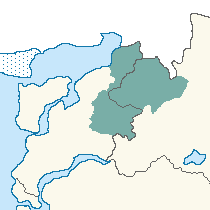Rianee Cooperative Reserve: Difference between revisions
Jump to navigation
Jump to search
mNo edit summary |
mNo edit summary |
||
| Line 9: | Line 9: | ||
}} | }} | ||
The Rianee Cooperative Reserve is a semiautonomous region composed of one province of [[Ashkenang]] and three provinces of [[Maloka]]. Founded in 2024 after the [[Final War of the Deluge]], it acts as a preserve for the seminomadic [[Glossary of peoples of Cusinaut#Q-T|Rianee]] people, with Rianee tribes having preferential hunting and fishing rights as well as | The Rianee Cooperative Reserve is a semiautonomous region composed of one province of [[Ashkenang]] and three provinces of [[Maloka]]. Founded in 2024 after the [[Final War of the Deluge]], it acts as a preserve for the seminomadic [[Glossary of peoples of Cusinaut#Q-T|Rianee]] people, with Rianee tribes having preferential hunting and fishing rights as well as the right to apply tribal law and land rights protections. Its landmass is largely wooded hills and tundra. It is one of the poorest and most sparsely populated regions in both countries, particularly in Maloka. | ||
{{Template:Faneria}} | {{Template:Faneria}} | ||
Revision as of 03:35, 21 October 2021
Rianee Cooperative Reserve | |
|---|---|
 | |
| Population (2025) | |
| • Total | est. 20,000 |
The Rianee Cooperative Reserve is a semiautonomous region composed of one province of Ashkenang and three provinces of Maloka. Founded in 2024 after the Final War of the Deluge, it acts as a preserve for the seminomadic Rianee people, with Rianee tribes having preferential hunting and fishing rights as well as the right to apply tribal law and land rights protections. Its landmass is largely wooded hills and tundra. It is one of the poorest and most sparsely populated regions in both countries, particularly in Maloka.